Def Leppard talk wild tours, guitar playing style and coping with Hysteria
A candid conversation with Phil Collen and Vivian Campbell
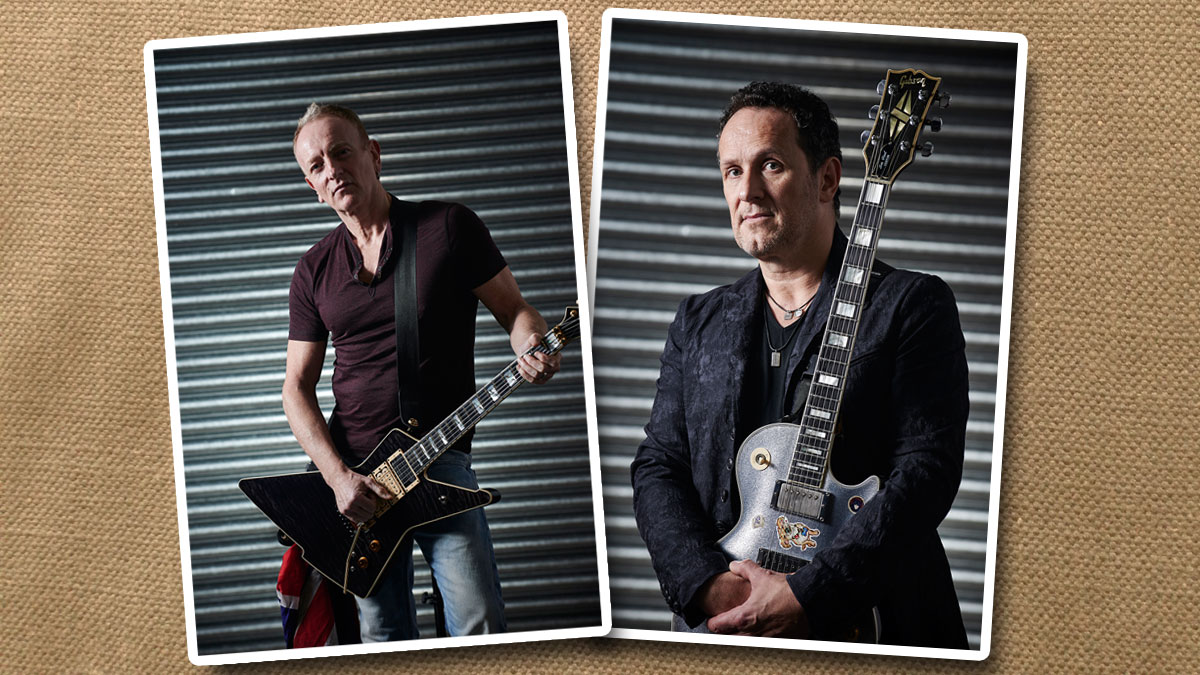
Introduction
Last year, Def Leppard, Whitesnake and Black Star Riders set out on an arena-filling joint tour. Guitarist joins Phil Collen and Viv Campbell backstage to hear about the band’s comeback album, the rules of Leppard riffing and the wild old days.
Def Leppard don’t do things by halves. It’s 16 December, and Guitarist is stood in the cavernous expanses of the Cardiff Motorpoint Arena, waiting for soundcheck, drinking in the scene. Speaker stacks dangle like forest fruits.
It’s clear that almost four decades after their formation in Sheffield, they can still command a stadium like few others
An army of roadies scurry between the spotlights like escapees from Colditz. A mile-wide plasma screen beyond the stage plays a slideshow of the band at their all-conquering 80s peak: young, topless, straw-haired rockers who can’t quite believe their luck.
Suddenly, the Leppard line-up is on stage, ripping into comeback single, Let’s Go, with a rabble-rousing abandon that belies the fact the venue is almost entirely empty. As Phil Collen and Viv Campbell strut out onto the stage’s ego-ramp to trade white-hot solos, it’s clear that almost four decades after their formation in Sheffield, they can still command a stadium like few others.
An hour later, Guitarist waits for the headliners in their production office. Campbell is first to arrive, toting a cut-and-shut Custom and chuckling about that time he auditioned for Ronnie James Dio while stoned out of his box. Then comes Collen, cradling his Jackson X-Stroyer and ready to field our enquiries with trademark aitch-dropping humour. Enough rawk. Let’s talk.
Don't Miss
Phil Collen on recording Def Leppard's Hysteria track-by-track
Def Leppard and Last In Line's Vivian Campbell: my top 5 tips for guitarists
Def Leppard's Phil Collen: the 11 records that changed my life
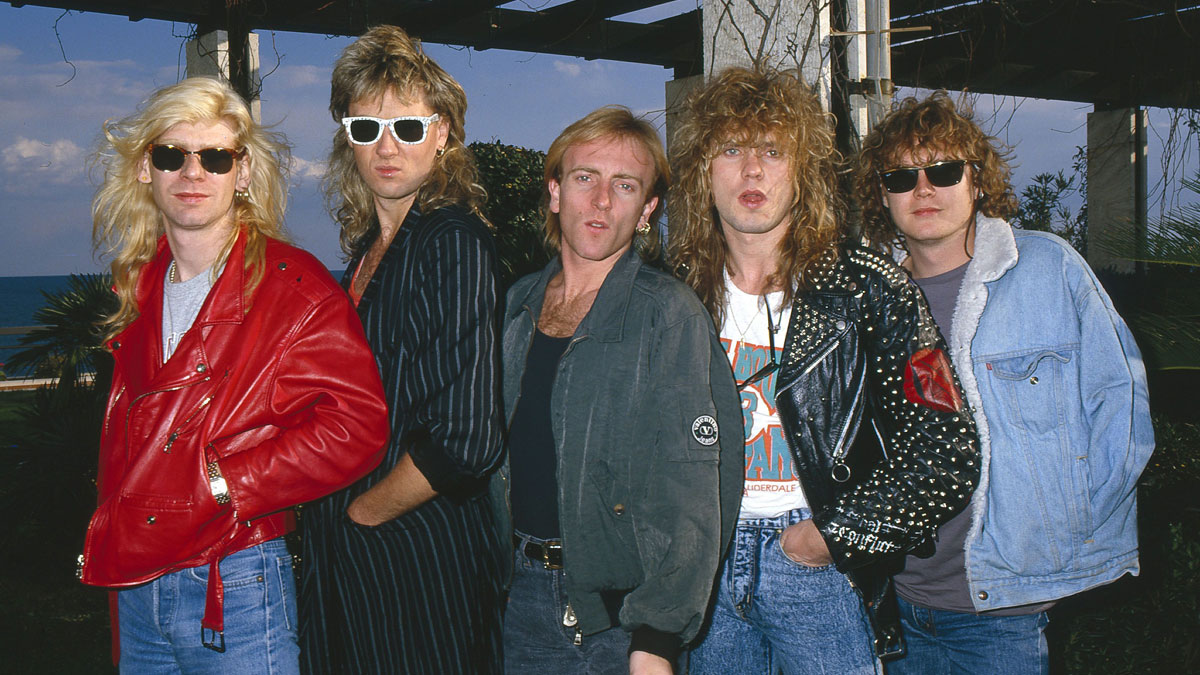
Hell-raising heyday
Be honest. How wild did Leppard tours get back in the day?
Phil: “Me and [late guitarist] Steve Clark used to drink a lot. We’d get bollocks-drunk and do really stupid things. I remember, we were in Holland once and I had this Porsche. We flew over a bridge, slithered on some leaves and went into a shop - and I got arrested. Stupid shit like that, which I really don’t think is funny. But it’s been 28 years since I’ve had a drink.”
How loud has this tour got?
It just flowed. It wasn’t browbeaten or serious. It wasn’t catering to any business agenda. It was about us
Viv: “Well, we had a few complaints the other night. Not from the council, from the audience. The low-end of the PA was deafening, apparently, so we’ve had to adjust things. But this tour has been fantastic. It’s almost like people think it’s our last tour: ‘Ah, we’d better see them before they cark it!’”
What musical vibe were you aiming for on the new album, Def Leppard?
Phil: “Well, you see, we wasn’t. Normally, we have a brief. Like the Slang album: that came after we did Pyromania, Hysteria, Adrenalize, which were all very processed, so we wanted something raw.
“The X album, we wanted it to be poppy, somewhere between Garbage and the Backstreet Boys. This time, we thought we were going in to write a single, and all of a sudden, we had an album. It just flowed. It wasn’t browbeaten or serious. It wasn’t catering to any business agenda. It was about us. Hence the title.”
Viv: “It’s probably the most diverse record the band has ever made. The last track, Blind Faith, is a psychedelic song: we’ve never done anything like that before. Yet it’s cohesive, because of the collective vocal sound. It’s like we’re the Beach Boys of meta l!”
Phil: “Every song was different. Y’know, you could have Last Dance, Sea Of Love, Dangerous. They all work together. There’s always new influences. If you asked what I was listening to, it’d be this band Hiatus Kaiyote. They’re neo-soul, like Erykah Badu and Jill Scott. And then the new Prodigy album [The Day Is My Enemy], which I fucking love.”

Get the guitar out of the way
What’s your criteria for a Leppard riff?
Viv: “Simplicity. A lot of hard-rock acts wouldn’t accept simple riffs. As a player, you want to make it tricky, you think that makes it better. Sometimes, it does. Mostly, it doesn’t.
“My whole tenure in Def Leppard has not pushed me as a guitarist, I think it’s safe to say. That’s not what this band is about. The challenge is the vocals, writing, production, performance. When I was playing with Dio: that was challenging. I was the only guitar player, and every song had not only a big riff, but a big-arsed solo.”
We try not to be superfluous. Like on Dangerous, it’s a very aggressive, punky, upbeat song - so the solo had to match
Phil: “Sonically, the guitar has to go in a certain place. There’s a lot of players who can really fuck up a singer’s melody because they’re oblivious and going right across it. With Leppard, the guitar can’t get in the way. It’s got to be intricately woven so it doesn’t fuck the vocals up, but still have a groove. I mean, there’s so many guitars on Hysteria, but they’re very obedient.”
Viv: “We try not to be superfluous. Like on Dangerous, it’s a very aggressive, punky, upbeat song - so the solo had to match. And it also has to be kinda thematic. I’d much rather it be like Mick Ronson than Yngwie Malmsteen. It’s not about how many 64th notes you can cram into an eight-bar solo.”
Do you have favourite chord voicings?
Phil: “I think everyone does. Bob Dylan said that we only write five songs, then we revisit them a million times. You always have the D, C and G - and the 9th versions - y’know, the lovely sounding chords.”
Leppard choruses drop like bombs: what’s the secret to writing them?
Phil: “It was working with [producer] Mutt Lange for so long. We’d come in and say, ‘Okay, this is the chorus.’ And he’d go, ‘Well, that isn’t actually strong enough.’ He upped our game. I usually hear choruses in my head. My phone is jam-packed with me singing shit.”
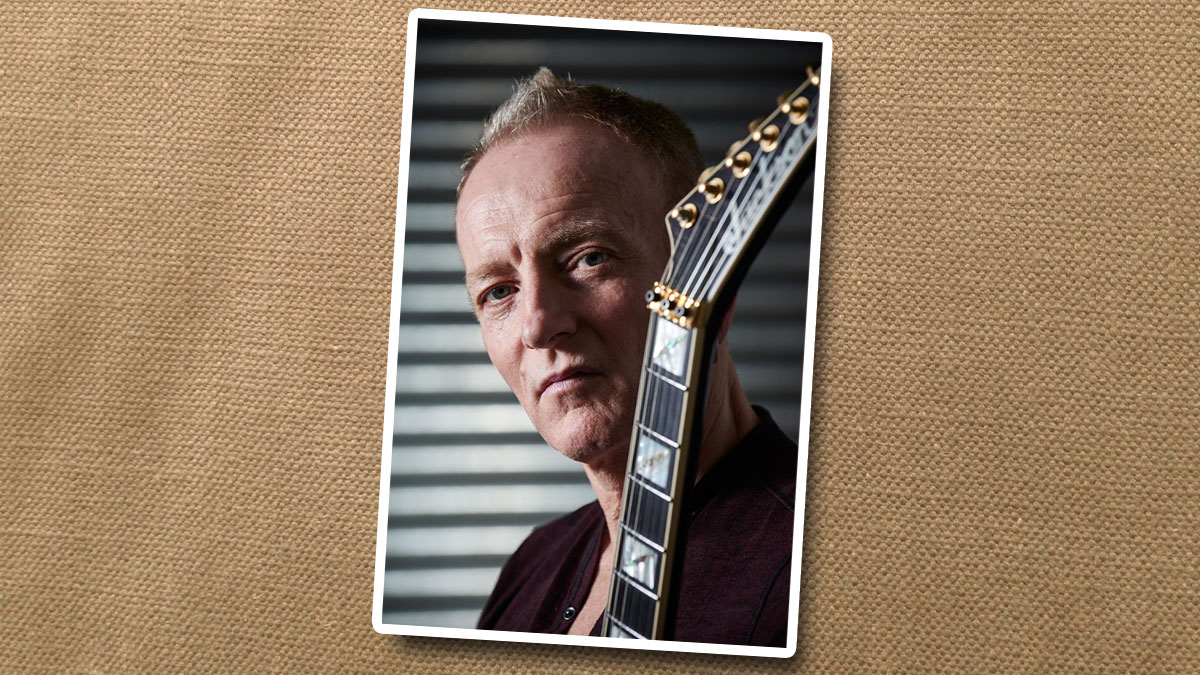
Dublin memories
So, for you, who are the great hook-writers on guitar?
Viv: “Well, Jimmy Page, y’know? I once got crucified because I said Page wasn’t a great guitar player. What I meant was, he’s not known as being the cleanest soloist. But I’d much rather be Jimmy Page than Yngwie Malmsteen. I don’t mean to rag on Yngwie, but, y’know, that kind of player.”
Pretty early on in the process, it starts becoming, ‘What do we need next to balance out this record?’
Phil: “Jimi Hendrix, Eddie Van Halen… the songs were what did it. I mean, Yngwie is amazing and all that - but more people picked up a guitar because Kurt Cobain played one.”
Do you have any memories of the sessions in Dublin?
Phil: “It was a joy. One of the great things was, we did it in three sections. It was a bit like The Stones, when they were at Muscle Shoals for two days and did Brown Sugar and Wild Horses. You didn’t get bogged down.”
Viv: “I never enjoy the recording process. I grew up making albums the old-school way. Record tracks live. Put on a few embellishments. Bang. Move onto the next song. The Leppard process is very timeconsuming, because there’s a lot of thought at every stage. It’s not so much about performance.
“It can be about the sound. It’s about the songwriting, mainly. Pretty early on in the process, it starts becoming, ‘What do we need next to balance out this record?’ Most bands don’t do that. In Dio, we were just like, ‘Anybody got a riff? Let’s make it into a song, record it, Bob’s your uncle, let’s go on tour.’”

String theory
Is the story about Mutt recording individual strings in the 80s really true?
Phil: “Well, that was the ‘I gotta know tonight’ part from the song Hysteria. Mutt said, ‘Let’s make it so it’s got this unique sound, nothing arpeggiated at all.’ My friend walked in and he thought we were fucking nuts.
How many guitar tracks go on a Leppard tune? More than I can count on my hands
“We’d do it on other parts, like the distorted part from Too Late For Love, for more clarity. But it was only the odd section. We didn’t record the whole thing like that!”
Leppard have a reputation for loading songs with guitar tracks: do you think that’s justified?
Viv: “How many guitar tracks go on a Leppard tune? More than I can count on my hands. But it’s not the same on every song. You take a song like Man Enough: there’s barely any guitars on that. Other songs, like Let’s Go, there’d be a load of guitars.”
Phil: “What was great about this album is that we knew when to stop. This was the first album we’ve done where we didn’t get confused in the studio. It was different when Mutt was recording us, because he was a genius, and he’d go, ‘Okay, let’s try this’ - and it usually worked.”
Would you say you can tell who’s playing what on this album?
People talk about amps and pedals: that’s a load of bumph. If we’re in the studio, and I have an idea, and Phil’s Jackson happens to be handy, I pick it up and it sounds like me
Viv: “Oh, very much so. People talk about amps and pedals: that’s a load of bumph. If we’re in the studio, and I have an idea, and Phil’s Jackson happens to be handy, I pick it up and it sounds like me. When he picks up my Les Paul, it sounds like Phil.
“It’s all in your hands. It’s in the angle of attack with the pick. It’s all innate to you and how you approach the instrument. And we approach them very differently. Phil is a very aggressive right-hand player. He articulates with his right hand. I very rarely do. I play much more legato, and with my left hand. Hammer-ons and pull-offs do a lot of the work.”
Phil: “The downside to being so aggressive is that I commit so much, that if I make a fuck-up, it’s glaringly obvious. I’ve got a slow vibrato, and I use three fingers to bend, almost like a stent.”
Viv: “I’m very heavy with my right hand, which is why I don’t articulate every note. I’m palm-muting a lot more than Phil. My first two guitar heroes that I seriously studied were Rory Gallagher and Gary Moore, and they were both very heavy with the right hand. Like, I got the pinch harmonic thing from Rory, and now, sometimes, I really have to consciously try not to do it.”
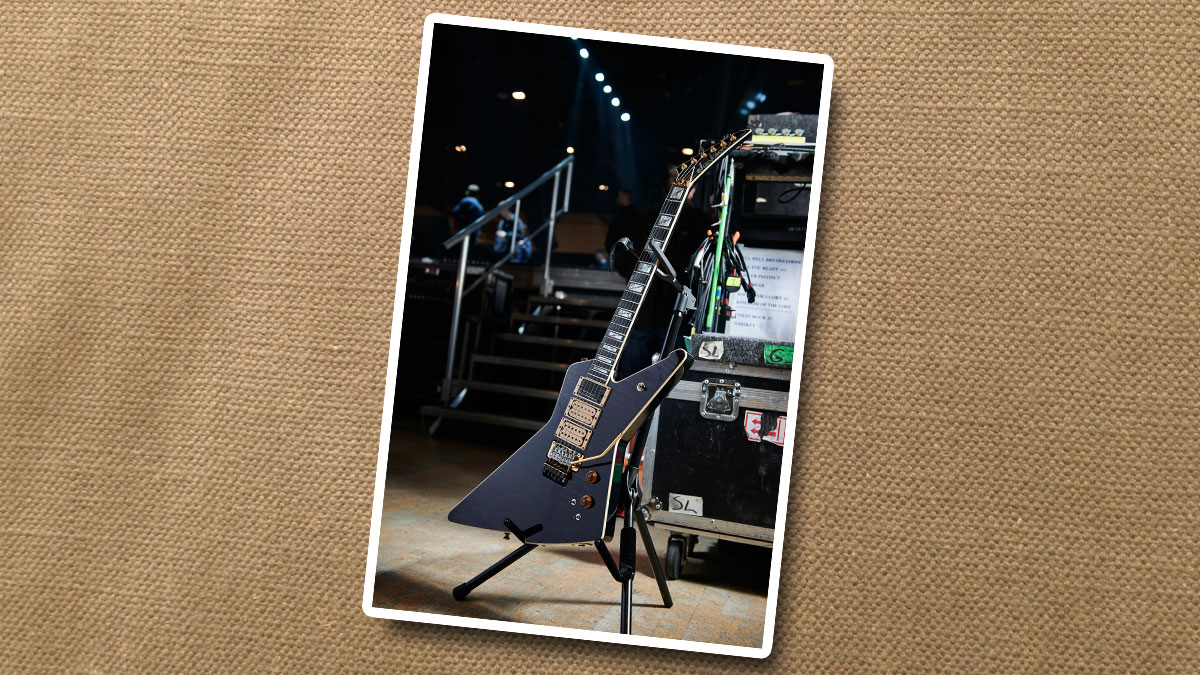
Titanium tracker
We’re guessing you used your Jackson PC1 for tracking, Phil?
Phil: “Yeah, mostly. This is my X-Stroyer. Feel the size of the neck on that. It’s just the sound and the feel of the thicker neck. At Jackson, we’re constantly tweaking my PC1 guitars, so they’ve evolved with all this titanium stuff [on the Floyd string retainer].
I use really heavy strings. They’re, like, 0.013 to 0.054. I also use the metal picks
“I use really heavy strings. They’re, like, 0.013 to 0.054. I also use the metal picks, and it sounds so different. Mutt used to say, ‘Wow, that sounds so much more present.’ For this record, I used a PC1 that stays at the studio. We had 0.014 to 0.056s on that one… you can really thrash it!”
And Viv, you used the hybrid Les Paul?
Viv: “Yeah. We believe it’s a ’78 Custom neck. I bought a black Custom in a pawn shop in Nashville in 1993. Then we travelled from Los Angeles to Spain, and the same guitar didn’t appear at the other end.
“The body was broken in two and everything - rear pickup, rear bridge and tailpiece - was smashed into the wood. It was obviously run over by something very heavy. But the neck survived, and that’s good, because that’s the reason I bought the guitar.
“So from the headstock, through the neck, through this front pickup, are original to the guitar, and then there’s a new [’59 Standard] body. This is the guitar I used for the album, more than any other. But when we make records, we put on so many guitar parts, you play whatever is there. Sometimes it’s like, ‘I can’t be bothered…’”

Walking in the air
How did you achieve your tones?
Viv: “There are JMPs on a lot of stuff, although I did have an Engl Blackmore head sent over to the studio. I also had an Engl 4x12 cabinet with Vintage 30s: the meat and potatoes of the album would have been done with that.”
We don’t stomp any pedals, no. I do miss being in control. I can’t even switch from a clean sound to distorted
Phil: “I used the Guitar Rig software, mainly the Marshall JCM800 model with various delays and choruses. No amps. No pedals. I’ve never been into pedals at all. I’ve always liked the amp to get the sound.”
You two don’t even operate pedals during a live show, do you?
Viv: “We don’t stomp any pedals, no. I do miss being in control. I can’t even switch from a clean sound to distorted. Somebody else is doing it for me. And sometimes he gets it wrong. And that’s interesting.”
We notice you’ve both got a Fractal Axe-Fx II out there…
Viv: “[Sighs.] I don’t even know how they work. I’m old-school. I’d much rather be straight into an amp. When I was younger, it was all about pedals: ‘Oh man, listen to this cool distortion.’ Now, if I had to be on a desert island with one pedal, it would be a wah-wah, and that’d be it.”
How much did you use computers for the album sessions?
Viv: “It’s way Pro Tools… I’m not so old-school that I insist on recording on analogue tape. Technology: it’s all how you use it. Modern records are compressed at every stage. They’re super-compressed in the recording process. They’re compressed again at the mixing stage. Then they’re compressed again at the mastering stage, because everyone wants their record to be louder than everyone else. But then you look at the soundwave and it’s slammed on both ends. There’s no air.
“I don’t like the way modern records sound, because of that, and it actually gives me ear fatigue. Whereas, if you listen to a record from the 70s, there’s warmth. I think Leppard use the technology well. But we’d never be the kind of band to go in and record on analogue. It’ll be a cold day in hell when that happens.”
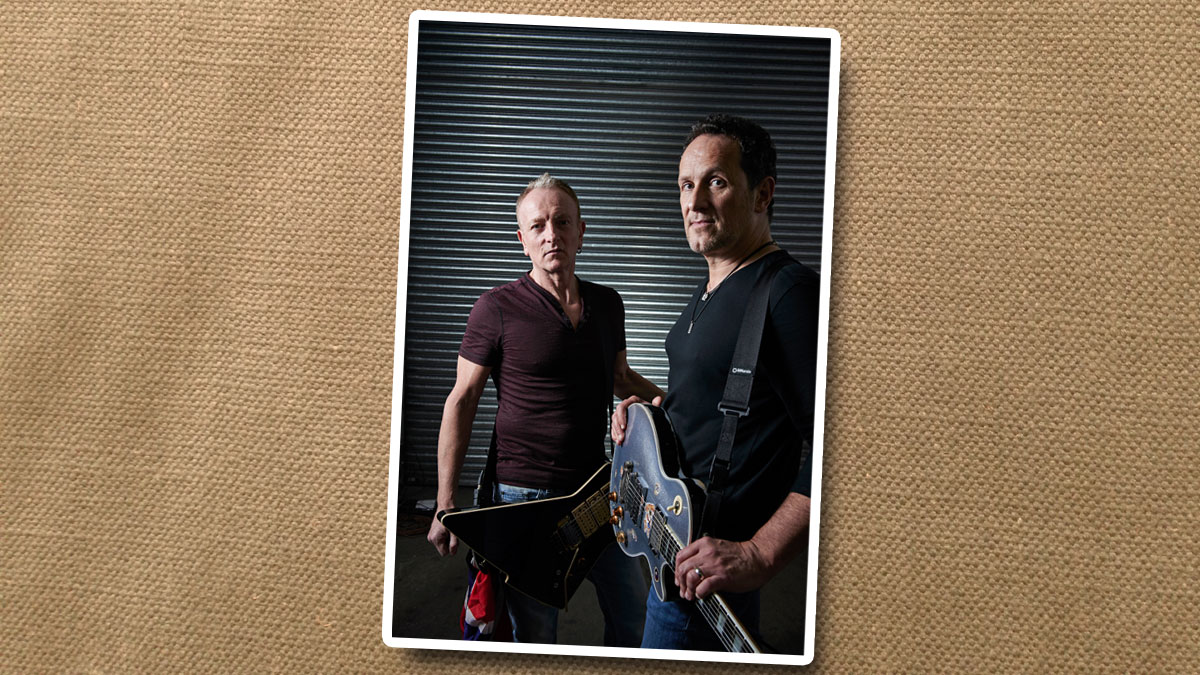
Don't look back in anger
Phil, how did you cope with the success of 1987’s Hysteria?
Phil: “What was interesting was that we’d had huge success with Pyromania. We went from the Marquee Club to Jack Murphy Stadium in nine months - and then three years of nothing. We had to start again from scratch. It was very humbling. The album didn’t break even. Gigs didn’t sell.
If I weren’t able to continue to work, I certainly would die. I know the disease would win
“Then, all of a sudden, Pour Some Sugar On Me just broke out in the strip clubs in Florida, then the album went to No 1. It went bonkers, but I think, because we’d learnt that it was fleeting from Pyromania, it didn’t make anyone big-headed. We realised how temporary everything is. How fragile.”
Viv, how has your cancer diagnosis changed your outlook?
Viv: “I was always a very positive person. My cup was always half-full. It’s now brimming. It definitely gives you an appreciation for every aspect of life. Y’know, I’ve no problem dealing with the illness itself. The hardest part has been wanting to continue to work and balancing that with my treatment.
“If I weren’t able to continue to work, I certainly would die. I know the disease would win. Now, every day is a good day. There’s no such thing as a bad show any more. If I do something wrong on stage, I don’t kill myself. Years ago, I would have gone, ‘Fuck! I screwed that up!’ Now, it’s water off a duck’s back. In the big picture, it doesn’t fucking matter.”
Is there hope for the future of rock guitar?
Viv: “There are great bands coming up. As far as what do you do with the instrument next, I have no idea. So much has been done. But then again, people probably thought in the late 70s, ‘Well, the guitar is played out’ - then along came Eddie Van Halen and rewrote the book. Y’know, there’s a poster for a Black Stone Cherry show happening here. So there’s definitely hope. It’d be nice to see if the guitar comes back into vogue the way it was for so long. All things are possible, y’know…?”
Don't Miss
Phil Collen on recording Def Leppard's Hysteria track-by-track
Def Leppard and Last In Line's Vivian Campbell: my top 5 tips for guitarists
Def Leppard's Phil Collen: the 11 records that changed my life

